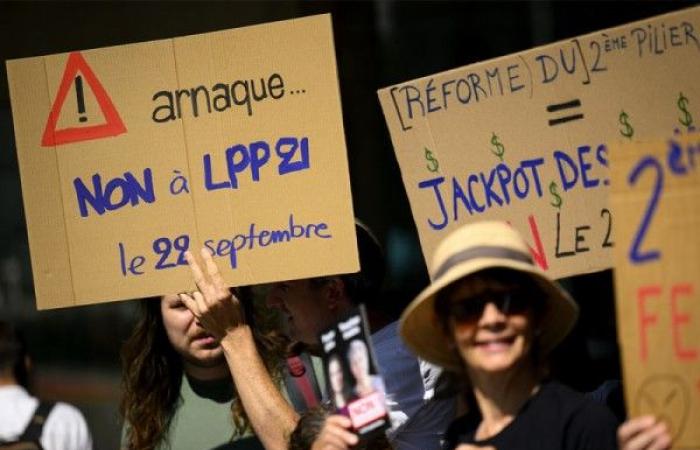The reduction in the conversion rate, which is to go from 6.8% to 6%, will lead to a reduction in LPP pensions for salaries starting at 4,000 francs, according to the USS.
The battle of numbers on the BVG reform, to be voted on September 22, continues. The loss of pensions will affect many more people than announced by the Federal Council, claims the Swiss Trade Union Federation (USS), based on its calculations. The Confederation is sticking to its models.
“This is an absolutely fundamental vote for the population, which affects everyone,” Daniel Lampart, chief economist of the USS, told the media on Tuesday. “And we are very concerned about the way the Federal Council presents the impact of this reform.”
The figures published by the Confederation “significantly embellish the situation and the effect on retirement pensions”, according to Mr Lampart. Even though the Federal Office of Social Insurance (OFAS) has already been wrong about the financial prospects of the AHV.
In the voting brochure, the Confederation states that working people with an annual income of more than 70,000 francs, or around 5,500 francs per month, will be practically the only ones to suffer pension cuts. And that young employees whose annual salary is between 25,000 and 40,000 francs would receive more than 300 francs per month in pension.
These calculations are based on totally unrealistic assumptions, according to the USS. They assume that a person will earn the same salary throughout their working life. “This is contrary to the reality of the world of work,” said Daniel Lampart. In general, employees do not earn the same salary at 25 or 50, because experience increases.
The reduction in the conversion rate, which is to be reduced from 6.8% to 6% with the reform, will in fact lead to a reduction in LPP pensions for salaries starting at 4,000 francs, calculates the USS.
A mirage?
As for the improvements in pensions for low and very low incomes, they will be very costly. For a monthly salary of 3,500 francs, the reform entails an annual increase in LPP contributions of 1,500 to 2,500 francs (depending on age), for an improved pension of barely 2,000 francs per year, or less than 200 francs per month of additional LPP pension. The balance sheet of the reform is therefore already negative for monthly salaries of around 3,300 francs per month, estimates the USS.
The improvements in pensions promised by supporters and the Confederation are in many cases “a mirage,” added Daniel Lampart. They exist only in the Confederation’s tables, which are therefore likely to mislead the electorate.
Retirees also affected?
Furthermore, contrary to what is being said, the reform also affects pensioners. Since pension funds need reserves to finance the compensation for pension losses decided by Parliament, the money will no longer be available to grant compensation for the cost of living that would have been due this autumn, explained Gabriela Medici, first deputy secretary of the USS.
Pensioners will have to bear the costs of these compensation measures alongside working people, and will therefore have to wait for additional years before their turn comes. In fact, pension funds are only obliged to grant such adjustments when their reserves are fully filled. However, over the last three years, the loss of purchasing power of an average 2nd pillar pension has amounted to the equivalent of around 100 francs per month, she added.
No comments
For its part, the Confederation does not want to comment on the new figures and scenarios used by the union. The OFAS refers to the figures of the Federal Statistical Office, “which gives a global and raw picture of the system and its development”, writes the office in response to the Keystone-ATS news agency.
As it has communicated so far, the OFAS maintains that it is “difficult, if not impossible” to obtain valid data for all insured persons. The pension system is far too diverse. The models used by the Confederation for the vote do not represent a realistic professional career, but show the benefits expected for the BVG minimum, for different variants.
It is rather “exceptional” that pension funds grant compensation for inflation, concludes the OFAS. They are not obliged to do so.
The USS may not stop there. It is considering possible legal measures such as an appeal against the vote, according to Mr Lampart, questioned by the press on this subject.






